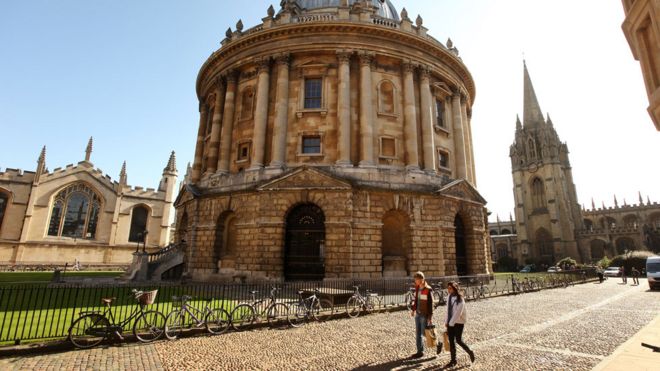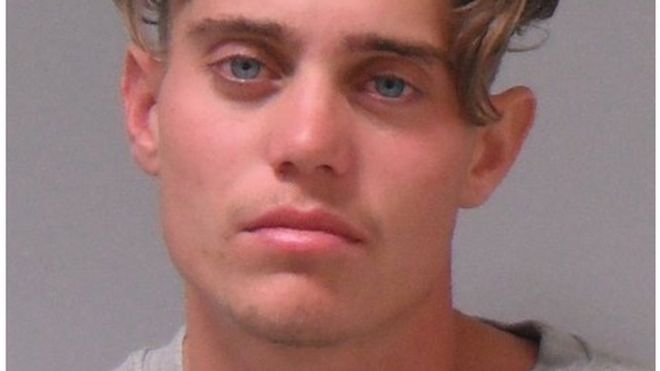University reporter,Oxford(wp/bbc):::
University of Oxford is promising a "sea-change" in admissions, with plans for a quarter of students to come from disadvantaged backgrounds by 2023.
The university wants to tackle accusations that it is socially exclusive.
Oxford will soon announce that 60.5% of its most recent intake are from state schools - the highest since the 1970s.
But vice-chancellor Louise Richardson says she wants to "accelerate the pace at which we are diversifying".
What's the problem they are trying to solve?
Oxford, along with other top universities, has faced claims of perpetuating privilege - with too many privately-educated students and not enough from poorer backgrounds.
The university wants to send a strong signal that it remains very competitive to get a place - but that should be about ability rather than background.
Prof Richardson says she wants to ensure that "every academically exceptional student in the country knows that they have a fair chance of a place at Oxford".
She is being supported by the head of the Sutton Trust, Sir Peter Lampl, who described the scale of Oxford's target as "really impressive".
How will they get more places for disadvantaged applicants?
At present about 15% of Oxford's students are from deprived areas - and the university wants to increase this significantly to 25% over the next four years.
An access scheme will have places for 200 high-achieving disadvantaged students each year.
These will be students, identified during the application process, who will be offered a place and then given extra support before beginning their degree courses.
Another 50 places will be available for a foundation year, aimed at developing students who show high academic potential, but whose education might have been disrupted or who had to overcome personal disadvantage.
Those who successfully complete the foundation year will go on to begin undergraduate courses.
What counts as disadvantaged?
It is not by income thresholds, ethnicity or whether families qualified for free school meals, but is based on a socio-economic profile of where people live.
This uses two postcode-based systems, called Polar and Acorn, which measure local levels of deprivation or affluence.
The particular focus of Polar is the level of entry to university from people living in that area.
There have been critics of Polar - including Universities Minister Chris Skidmore, who wants to find a better way of showing disadvantage.
For instance, a very poor area with relatively high levels of university entry, such as in some parts of London, might not appear to be disadvantaged.
Is this another squeezed middle?
If 25% of places are to be targeted at applicants from poorer areas - and in recent years, about 40% of places have gone to pupils from private schools - then that leaves 35% for everyone else.
That would be the remaining slice of places for all those state school pupils who do not live in the most deprived areas - which is to say, state-educated families in the middle.
Such an analysis is rejected by Oxford - with the university saying there is no reason to assume that so many places will go to private school pupils in the future.
The next round of entry figures, covering 2018, will show 60.5% of students from state schools, more than about 58% in the two previous years, and the highest in these records going back more than 40 years.
There might be an extra 250 places for deprived youngsters - but on current trends, there will be more than 700 overseas students.
Will this stop accusations of snobbery and elitism?
Very unlikely. As the competition for places at top universities has become more intense, so too has the public scrutiny.
Such famous universities are seen not only in terms of academic excellence, but as markers of social status and a passport to top professions.
So there will be more questions about what "fair" entry means - and arguments over representative intakes and "social engineering".
Chris Millward, the Office for Students' director for fair access, says there will be more "pressure" on universities over access for disadvantaged students.
But there are concerns from the private school sector about not making unfair assumptions.
"Many pupils in state schools come from high-income homes and many pupils attending independent schools receive means-tested bursaries," said Julie Robinson, chief executive of the Independent Schools Council.
Labour's shadow education secretary Angela Rayner said "this is an important step in the right direction" - and that "for too long our top universities have been a closed club".
Mr Skidmore welcomed the announcement, saying such universities should be open to everyone who "has the potential".

